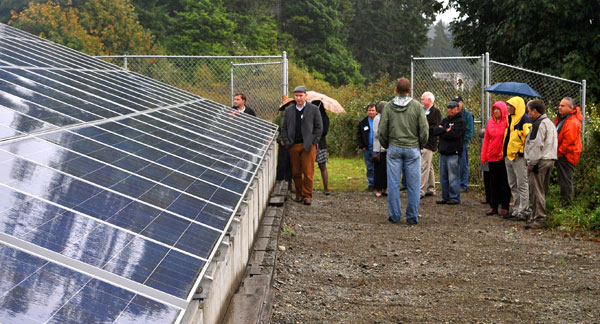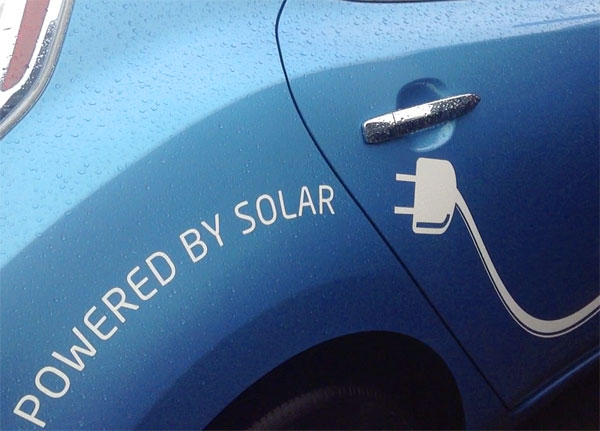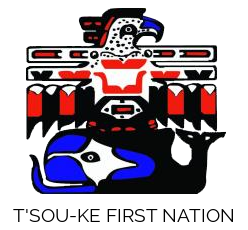Gifts from the sun keep on coming for T’Sou-ke First Nation. On the same day that the nation was named Canada’s first Aboriginal solar community, word came of a $175,000 award for its commercial greenhouse project. So, T’Sou-ke will soon be producing electricity and hot water from the sun as well as using its rays to grow food for international markets as well as southern Vancouver Island.
“We are setting the table for future generations,” Chief Gordon Planes told a group of municipal and provincial politicians and other solar friends who gathered in the community hall. “There is an appetite for change and I really believe that the next generation is the one that is going to make positive changes. The Creator provided the resources for us to take care of ourselves. We are doing that a lot… I see huge opportunity for all of us and I encourage others to get in the canoe with us to build a stronger, sustainable economy. All of us can prosper together.”

Surrounded by electric cars recharging are: Andrew Moore, Chief Planes with sundial, Bob Haugen of Solar City, MLA Mike Bernier and Colwood Mayor Carol Hamilton
Chief Planes announced that T’Sou-ke had been awarded $175,000 by the Nuu-chah-nulth Economic Development Corporation towards its commercial greenhouse project. The four connected greenhouses will be used grow organic wasabi for international markets through a partnership with Pacific Coast Wasabi. He said the project would also support the nation’s community garden in order to improve food security for the region.
“We will be providing training and jobs both in the construction of the greenhouses and in the growing and harvesting of the wasabi and other foods,” Chief Planes said. Four 35-by-150-foot greenhouses will be built in order to grow one-half acre of wasabi.
Bob Haugen of the Canadian Solar City Project presented the chief a brass sundial created by the solar for T’Sou-ke meeting the criteria established to recognize the most sustainable communities in Canada. The sundial was created at the Lunenburg Foundry in Nova Scotia using a solar furnace.
One of the guests at T’Sou-ke included MLA Mike Bernier who is chair of BC’s Aboriginal affairs committee. He is the former mayor of Dawson Creek, which was named the first Solar City in Canada last year. Leaders from the districts of Sooke and Colwood as well as the Capitol Regional District and Royal Roads University also attended.
The day began with a lesson about solar electricity outside the community hall. As two electric Nissan Leaf cars were being recharged alongside an electric bicycle, Ed Knaggs of Home Energy Solutions talked about power generation, T’Sou-ke style.
Five years later… the sun shines on T’Sou-ke
T’Sou-ke began its journey to become a sustainable solar community in 2008 with a comprehensive community planning process that involved everyone, including children. The guiding principle for the planning was based on the Seventh Generation, planning 100 years ahead. T’Sou-ke realized that in order to achieve sustainability, it needed to embrace traditional values including deep respect for Mother Earth.
In order to produce electricity, large photovoltaic systems were installed above and beside the community’s canoe shed. Solar hot water systems were installed on 40 houses and a comprehensive energy conservation program took place.
Ten members of the community received training in installing solar hot water systems and worked with contractors in placing those systems on half the houses on the reserve and in the community kitchen. The entire community got involved in energy conservation initiatives when T’Sou-ke discovered that it costs just one-tenth the price to save energy as it does to produce it.
An unexpected side benefit of the T’Sou-ke solar project was that the nation created a unique eco-tourism program. When solar installations were completed in 2009, T’Sou-ke invited all levels of government and First Nations to a weekend gathering with much dancing and drumming, solar tours and workshops. This year alone, T’Sou-ke has had 32 schools, 54 municipalities and tourists from all over the world come for tours and workshops. Entire BC ministries also come for day trips that include barbequed salmon and salads from T’Sou-ke current greenhouses.

Guests got a tour of the electricity-producing solar panels

Greenhouses will soon be producing wasabi and other foods

T’Sou-ke has its own solar-powered charging station for vehicles

Traditional energy was used to cook the salmon
